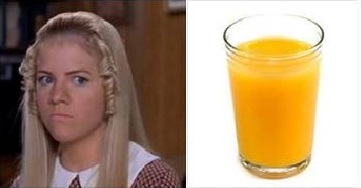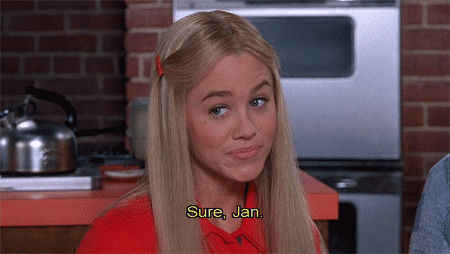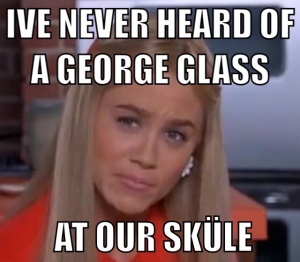It’s happening. The first new meme of 2015…and who would have guessed it would come from a Brady Bunch movie from 20 years ago?
If you’re new to the meme, this is where you can find the clip that started it all:
And if you’re unwilling to watch this one-minute video (or for whatever reason, can’t) here’s your quick summary: Jan Brady tells her family she has a new boyfriend, George Tropicana Glass. Marcia says she has never heard of him (and in the process butchers the pronunciation of the word “school”). Jan insists her made-up boyfriend is real. Marcia responds with a disbelieving “Sure, Jan” complete with an impressive shade-throwing expression.
All in all, I think this clip has demonstrates great meme-ability. Here are some “meme traits” that I think helped launch Jan and Marcia Brady into the spotlight in 2015:
- A relatable situation
 For the Brady Bunch, it’s Jan and her on-the-spot, awkwardly poor lying about her made-up boyfriend. Making up a fake significant other to seem cool/less pathetic or to get someone to stop asking when you’re going to find someone is totally relatable. More relatable – > more likely for people to enjoy and share -> more meme potential.
For the Brady Bunch, it’s Jan and her on-the-spot, awkwardly poor lying about her made-up boyfriend. Making up a fake significant other to seem cool/less pathetic or to get someone to stop asking when you’re going to find someone is totally relatable. More relatable – > more likely for people to enjoy and share -> more meme potential.
2. Bad grammar, mispronunciation, misspelling, or any other such butchering of the English language
 Did you hear Marcia say “school”? (Or sküle, as memeland has phonetically dubbed it?) What even was that word, Marcia? Her weird pronunciation is humorous, memorable, and easy to recycle and reuse in new and different contexts, giving it excellent meme potential.
Did you hear Marcia say “school”? (Or sküle, as memeland has phonetically dubbed it?) What even was that word, Marcia? Her weird pronunciation is humorous, memorable, and easy to recycle and reuse in new and different contexts, giving it excellent meme potential.
3. Memorable imagery or facial expressions
 The shade in Marcia’s disbelieving expression and her condescending “Sure, Jan” at the end of the clip. It’s funny, relatable, and has excellent reuse potential as a reaction gif for anytime you need to throw some shade. In fact, one site suggested “Sure, Jan.” might be the next “Bye, Felicia!”
The shade in Marcia’s disbelieving expression and her condescending “Sure, Jan” at the end of the clip. It’s funny, relatable, and has excellent reuse potential as a reaction gif for anytime you need to throw some shade. In fact, one site suggested “Sure, Jan.” might be the next “Bye, Felicia!”
A few things fascinate me about memes: first, how quickly they spread and evolve. I think memes spread quickly based on two primary factors: humor and relatability. Relatability draws us in and humor makes us remember. Both give us reasons to share with others, creating viral content.
Next, I’m interested in how memes can originate from content that isn’t even recent, or content that previously seemed culturally irrelevant. I think memes are a great way to demonstrate how people’s views, their likes and dislikes, their values, and so on change over time: we can see them through what is created and deemed important (based on the level of sharing the content receives). These “flashback” style memes – based on content from years past that suddenly becomes relevant – is also a great testament as to how the internet has changed and shaped our lives. We couldn’t have a Brady Bunch meme back when the movie came out the way we can today, because the state of the internet (and our lives) is so different.
And finally, the level of confusion for “meme-outsiders” is always an interesting reflection on communication – whether someone just is not familiar with the content or is familiar with it but completely doesn’t get the joke. Is the familiarity, the general relatability of the meme, not applicable to them? Is it just not their style of humor? Are they secretly a soulless robot? Who knows. Maybe one day we’ll have a Meme Sküle to help them out, but until then, we have Jan and Marcia Brady.

